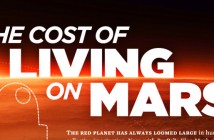Quick Facts about Mars
Mars derived its name from the Roman God of War and recognized as the Red Planet because of the reddish appearance it displays. The land area of The Red Planet is almost similar to the Earth. The rust and bright color of this planet is due to the iron-rich minerals on its regolith-the rock and loose dust covering on its surface. Here are more other quick and interesting facts about Mars that individuals ought to know:
Size
The size or equatorial diameter of Mars is 4220 miles or 6792 kilometers. This is just about half the size of the earth which is 7926 miles or 12756 kilometers.
Mass
The Earth’s mass is greater than the mass of Mars. Earth is about 5972 sextillion kg while Mars is 642 sextillion kg.
Volume
Mars got 15% of the Earth’s volume. In order to completely fill the volume of the Earth, it would require more than six Mars volumes.
Density
Mars is 71% as dense as the planet Earth.
Structure
Scientists do not have definite explanation that would determine if the structure of Mar is liquid, solid or two separate sub-layers. However, further studies and measurements can help and tell individuals more about the planet’s composition. The structures of this planet are crust, mantle, liquid external core and solid core.
Distance
When talking about the distance, Mars is 142,000,000 miles far from the sun and this is about 229,000,000 kilometers or1.5 in Astronomical Units or AU. On the other hand, Earth’s distance from the sun is 93,000,000 miles or 150,000,000 in kilometers and 1 Astronomical Units or AU.
Speed
The speed or velocity of Mars relative to the sun is 53,858 mph or 86,676 kilometers per hour while the Earth got a speed of 66,622 mph or 107,218 kilometers per hour.
Year and Day
It takes 365 days here on Earth to complete a year while in Mars; it requires 687 Earth ays to complete a year. In this planet one day is equivalent to 24 hours while in Mars; it is 24 hours and 40 minutes.
Seasons/Tilts
Similar tilts simply means that Mars got seasons that are almost similar to the Earth. But since a single year in Mars is longer as compared to Earth, the seasons are expected to be longer. Due to the elliptical orbit of Mars, some of its seasons are longer as compared to the seasons felt on Earth. Northern Hemisphere got longer summer and spring while the southern one got longer winter and autumn.
Atmosphere
The approximate composition and characteristics of Mars were studied and was compared to the atmospheric compositions and descriptions of the Earth. It was found out that the Earth’s atmosphere is more than a hundred times denser as compared to Mars atmosphere. The Earth’s atmosphere is made up of 78% nitrogen, 21% oxygen and 1% other elements while Mars atmosphere is made up of 96% dioxide and certain percentages of elements like argon, nitrogen and others.
Weight
Weight is defined as measurement of the effect of gravity on mass. This varies depending on factors like gravity of the planet, individual mass and distance between the individual and the center of the planet. If you weighed about 100 lbs on planet Earth, your weight in Mars would only be 38 lbs.
Gravity
In Mars, you will certainly experience 62.5% gravity, which is lesser when you are on Earth.




